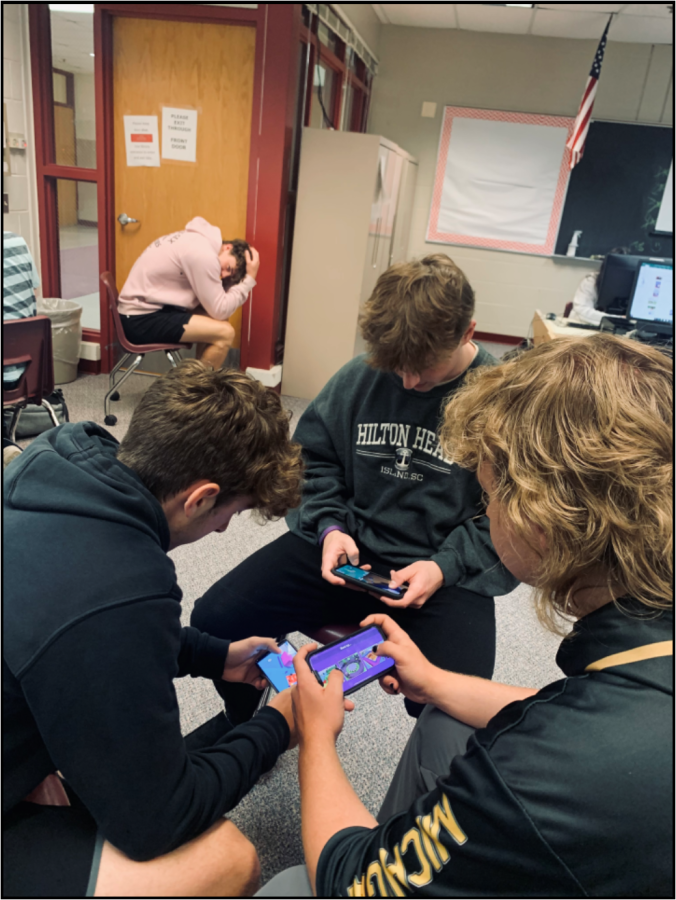Pandemic leads to more loneliness in teenagers
Seniors Ethan Groh (left), Zack Bonza-Brodie (right), Ryan Hanlin (middle) playing games together leaving senior Jett Edson alone (Photo by Izzi Putrus).
June 3, 2022
With the start of the pandemic, everyone distanced themselves from seeing friends and family in person. After such a long period of being in quarantine, and locked away from human interaction, many people learned how to be alone better than being with others. The simple, everyday routines we relied on before the pandemic gave us multiple opportunities for connection and interaction that many now miss out on. Getting back to being around others may also be very difficult for many teens and leaves many feeling lonely.
For many adolescents and young adults, school plays one of the biggest parts in social lives. Going to school each day helps connect one another to their peers, and helps social lives flourish amongst students and their peers. When the pandemic started, everything was suddenly taken away for many. Social lives and friendships were separated for months after months. For many Americans who have been socially isolated, recovery from the pandemic may take a long time and could affect people’s view of their relationships over time, which may cause strain on relationships.
A 2020 Cigna study which surveyed 10,000 adults across the United States, found that loneliness was at epidemic levels (newportacadamy.com). Millennials are the loneliest generations in today’s world. Which is about 71% of people today. Loneliness in young adults can exacerbate or be a catalyst for depression, anxiety and suicidal thoughts, which in turn leads to more loneliness. That’s because the symptoms of depression and anxiety, such as low self-esteem and low energy, often prevent people from reaching out to others and engaging in social activities. Senior Taryn Marshall talked about how coming out of quarantine had a huge impact on her mental health stating, “when we came back to school it was really scary and hard for me because during quarantine I got so used to being alone that I developed social anxiety which still affects me today.”
With feelings of loneliness and depression, some may face health risks. According to a 2019 study by the CDC, the suicide rate for Generation Z increased by more than 50% between 2007 and 2017. During 2020 at the start of the pandemic, a total of 12.2 million U.S. adults reported serious thoughts of suicide and 1.2 million attempted suicide. Health resources and services administration researchers say that loneliness and social isolation is as damaging to health as smoking 15 cigarettes a day (www.inc.com). Even though many say they do not need friends or they are too busy, there is no good excuse to put your body through health complications.
With the many health risk factors here are some tips to help push through: Start by limiting social media use. This sounds like it would have the opposite effect, but social media actually is damaging to people who are already struggling with loneliness. A 2018 Journal of Social and Clinical Psychology article revealed that cutting down usage of Facebook, Instagram and Snapchat led to significant reductions in loneliness and depression over a time period of three weeks. Something that could help a lot is reconnecting with old friends and trying new things together. Some fond memories may return. If you are having major feelings of depression, loneliness, anxiety or thoughts of suicide don’t hesitate to tell someone. It could be a friend, family member or a teacher. At Milford High School we have many helpful resources and people to talk to. If you are not comfortable to reach out there are many anonymous websites that offer free sessions. Other options include contacting the suicide hotline 1-800-273-8255, they offer 24-hour support. There is also a crisis center who offers text and call. Crisis Text Line: Text HOME to 741741. The Crisis Call Center: 775-784-8090. Don’t be afraid to
